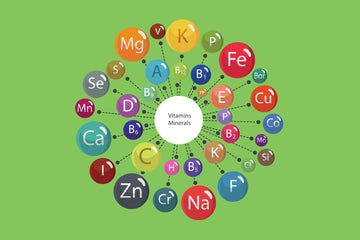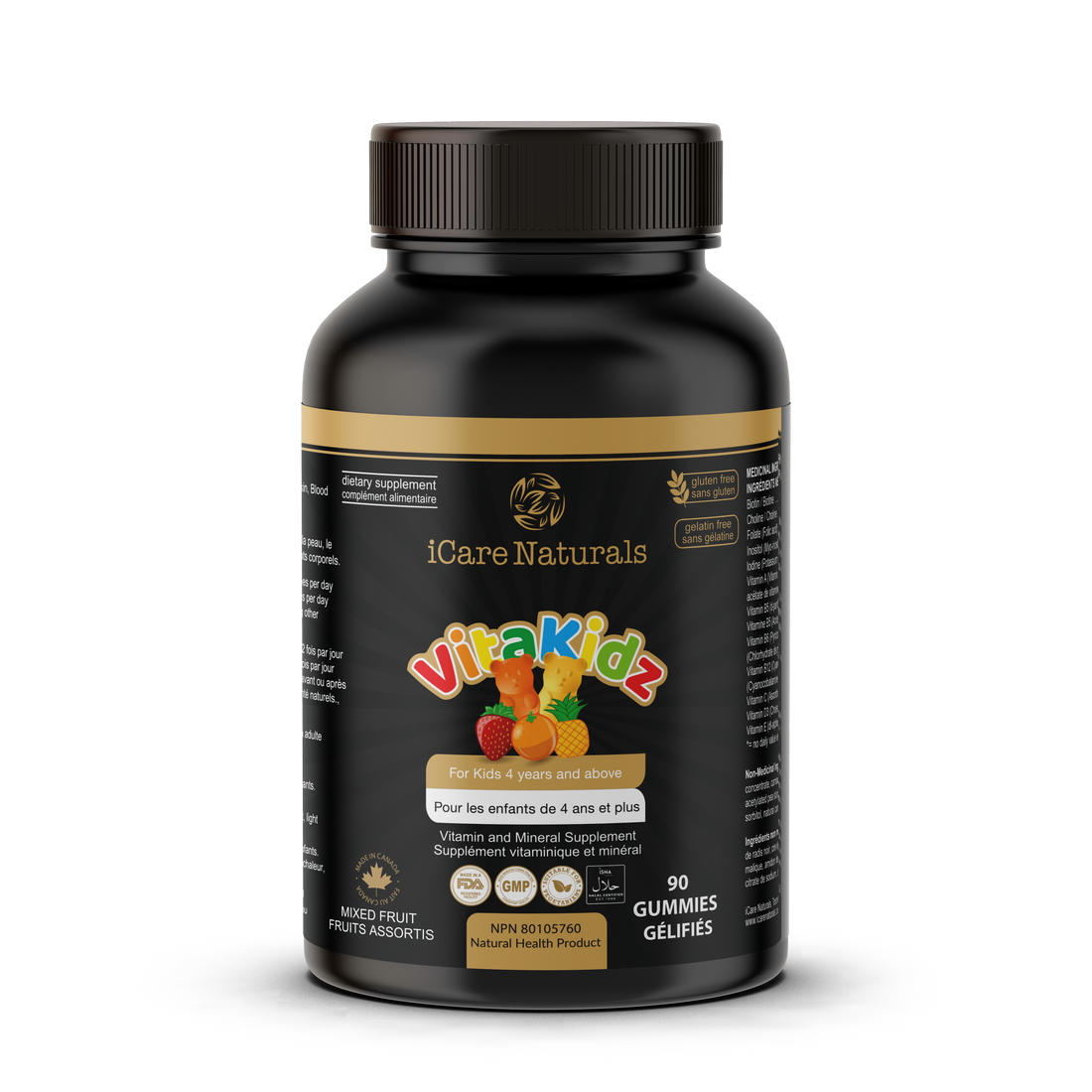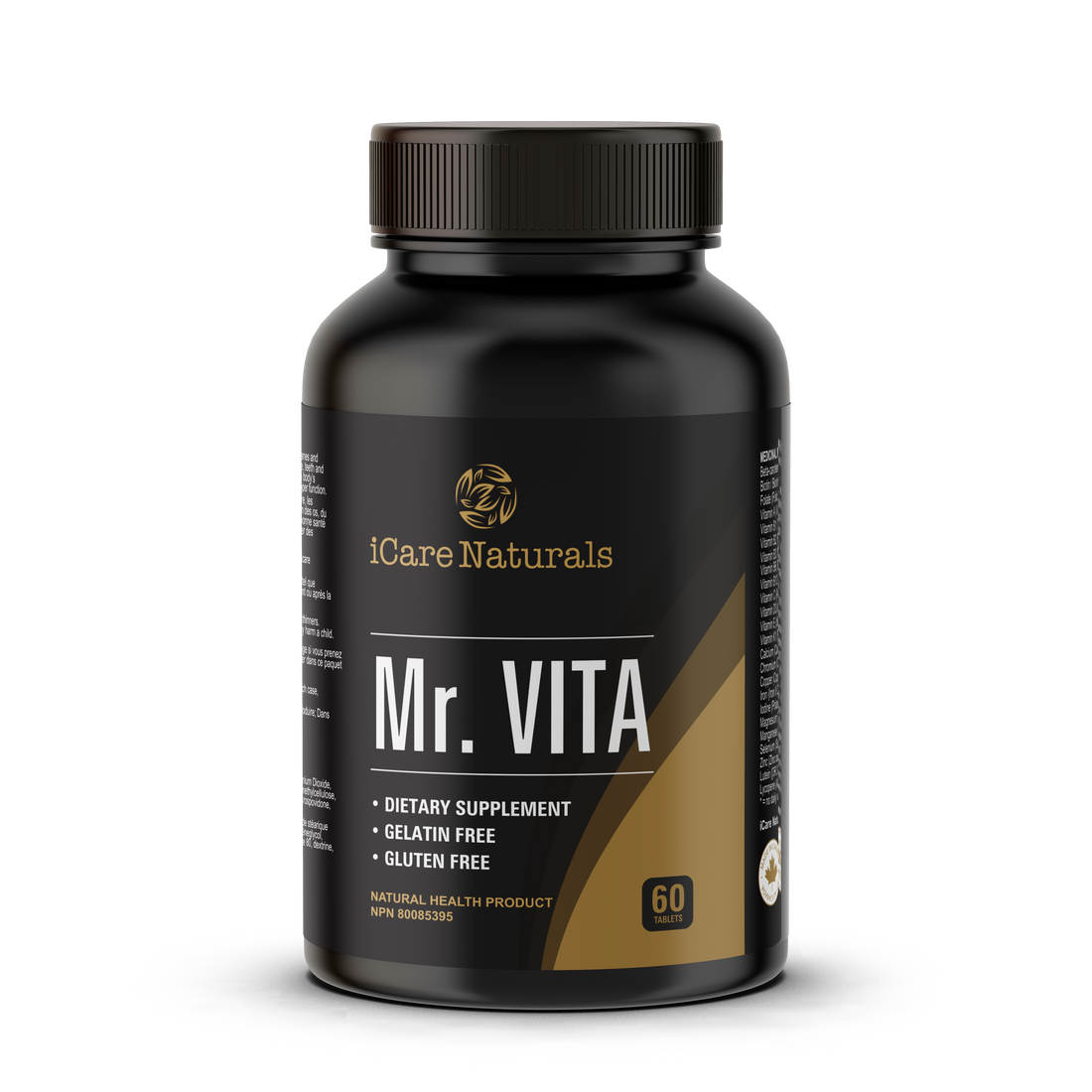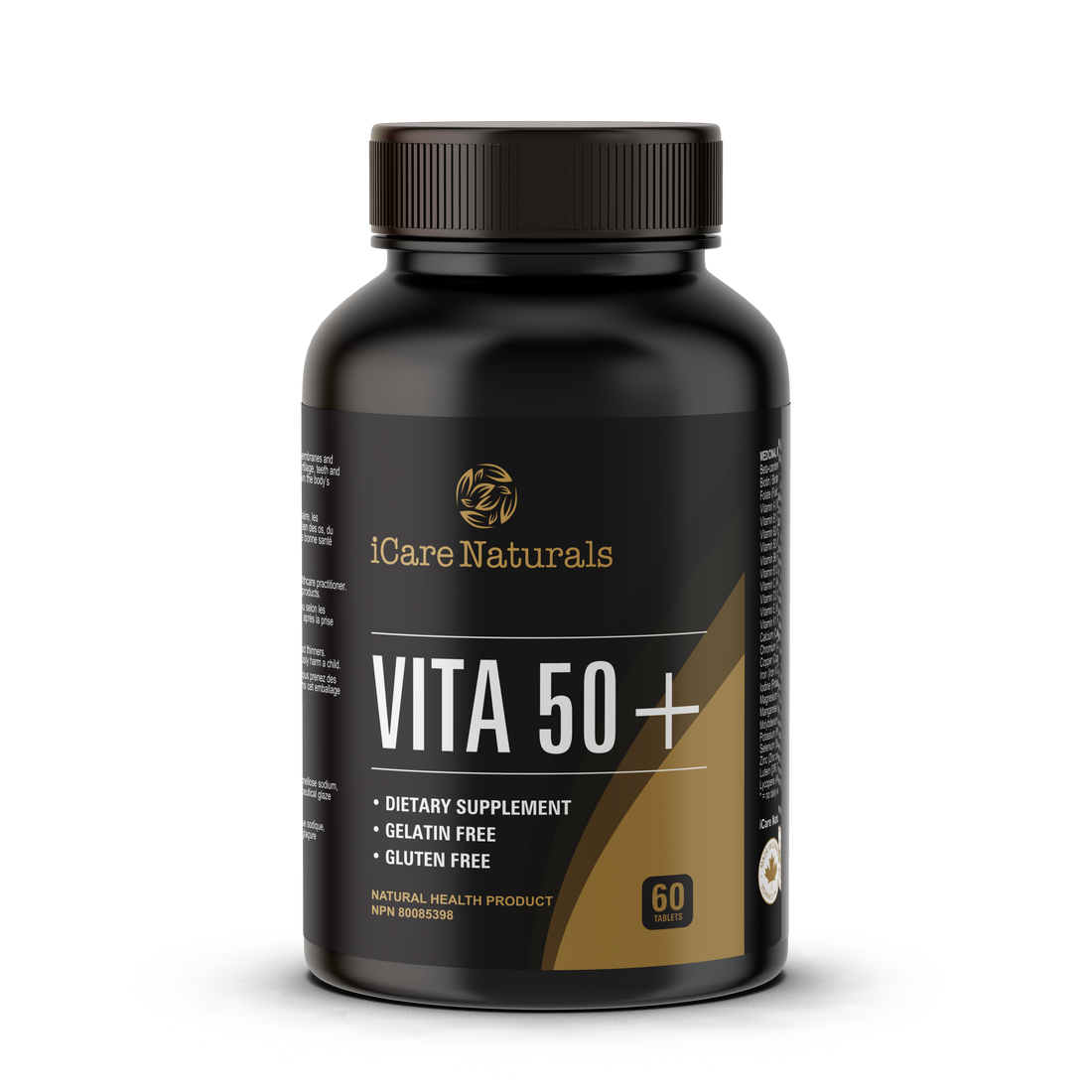Amidst our busy lives, we must ensure that our bodies are well-nourished and equipped with the proper nutrients to fuel our adventures, work, and day-to-day activitiesThe Vitamin and Minerals Market in Canada is predicted to reach $3.1 billion in 2021 and $4.7 billion in 2030..
From supporting our immune system during chilly winters to enhancing our cognitive functions for peak productivity, these nutrients play a vital role in helping us maintain an active and fulfilling life. Explore the top ten vitamins and minerals to keep you feeling your best.
What are Vitamins?
Vitamins are organic substances that our bodies need in small amounts to function optimally. They act as crucial co-factors in various biochemical reactions, allowing our bodies to perform essential functions like growth, energy production, and maintaining a robust immune system.
Unlike macronutrients such as carbohydrates, proteins, and fats, which provide energy, vitamins do not directly fuel our bodies. Instead, they act as catalysts, supporting the processes that enable us to thrive.
Why are Vitamins Essential for the Human Body?
When you get a balanced mix of these essential nutrients through natural, wholesome foods, you're setting yourself up for a life filled with energy, vitality, and endless possibilities.
Here are some reasons why vitamins help you ;
- Energy Booster
- Boost Immunity
- SuperSkin Defender
- Bone Builders
- Mood Elevator
- Youthful Glow
- Muscle Supporters
Types Of Essential Vitamins & How To Get Them?
Vitamin A
Vitamin A is a vital nutrient that works wonders for our overall health, ensuring our organs function smoothly and efficiently. From our heart to our lungs, liver, and other essential organs, vitamin A is crucial in keeping them in top-notch shape.
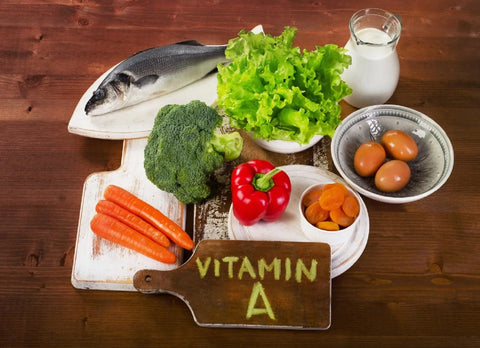
Also known as beta-carotene, vitamin A is a superstar supporting our well-being. Reproductive health is one area where it shines, ensuring our reproductive organs' proper development and functioning.
Our eyesight also benefits significantly from vitamin A. It supports the health of our eyes and helps us maintain clear and sharp vision. This nutrient is essential in low-light conditions.
Vitamin A is also an excellent immune system booster. Supporting our immune cells' functioning empowers our bodies to fend off infections and illnesses, helping us stay strong and resilient.
Primary Source of Vit A
- citrus fruit - including oranges and grapefruit
- Red and green peppers
- Potatoes
- Strawberries, blueberries, and blackberries
- Green leafy vegetables - such as broccoli and Brussels sprouts
Vitamin B
There are eight essential B vitamins, each playing a unique role in keeping our bodies energized and thriving.
- B1 (thiamin)
- B2 (riboflavin)
- B3 (niacin)
- B5 (pantothenic acid)
- B6 (pyridoxine)
- B7 (biotin)
- B9 (folate)
- B12 (cobalamin).
One primary aim of vitamin B is to transform food into energy. Whether it's carbohydrates, fats, or proteins, B vitamins are energy converters, ensuring we have the fuel to power through our busy days with gusto.
But that's not all - B vitamins act as a multitasker, essential for cell development, growth, and proper function. They play significant roles in maintaining healthy skin, hair, and nails, and they're involved in the production of red blood cells, which transport oxygen throughout our bodies, keeping us energized and alive.
Certain life situations may call for increased attention to B vitamin intake. For the elderly, gastrointestinal surgery, or gastrointestinal disorders, extra B vitamins might be needed to support digestion and nutrient absorption.
It is particularly vital for pregnant women or planning to conceive, as it plays a crucial role in preventing birth defects and supporting healthy fetal development.
Primary Source of Vit B
- Salmon
- Liver
- Beef
- Avacado
- Whole grain
Vitamin C
Vitamin C, or ascorbic acid, is a powerhouse nutrient with many benefits. One of its remarkable roles is bolstering our immune system, acting like a shield to defend our bodies from invading germs and illnesses. But that's not all – vitamin C also plays a crucial part in increasing iron absorption from plant-based foods and supplements, helping us maintain optimal iron levels and supporting our overall health.
As an antioxidant, vitamin C is a vigilant guardian, protecting our cells from the harmful effects of free radicals. These pesky free radicals can wreak havoc on our cells, leading to oxidative stress and damage. With vitamin C, we can feel confident that our cells are well-protected, allowing our bodies to function at their best.
Wound healing is another area where vitamin C truly stands out. This essential vitamin plays a crucial role in producing collagen, the building block of our skin, tissues, and blood vessels. As a result, vitamin C aids in wound healing, helping our bodies mend and recover more efficiently.
Primary Source of Vit C
- Oranges
- KiwiFruit
- Bell Peppers
- Papaya
- Tomatoes
Vitamin D
This essential vitamin ensures our bones stay strong and our immune system remains vigilant against potential invaders.
One of the key secrets to Vitamin D's bone-building abilities lies in its ability to assist our bodies in absorbing calcium effectively. Calcium is like the building block of our bones, providing the necessary strength and structure. However, calcium needs a reliable delivery service, and that's where Vitamin D steps in as the ultimate calcium conductor.
Vitamin D ensures that our bones receive all the required nutrients to stay solid and robust. Facilitating calcium absorption from our diet and supplements ensures that our bones remain strong and healthy.
Beyond its role in bone health, Vitamin D is essential to our immune system. It is a powerful ally, helping our immune cells function optimally to defend our bodies against infections and illnesses.
Primary Source of Vit D
- Egg Yolk
- Milk
- Mushroom
- Salmon
- Cheese
- Yogurt
Vitamin E
Like Vitamin C, Vitamin E is an outstanding antioxidant, acting as a vigilant defender of our cells against the harmful effects of free radicals. Vitamin E helps keep our cells healthy and operating effectively by neutralizing these free radicals, improving our overall health.
But that's not all – Vitamin E also helps to strengthen our immune system! It strengthens our body's defense systems against infections and diseases by promoting the regular activity of our immune cells, allowing us to remain resilient and healthy.
Another crucial role of Vitamin E is in preventing blood clots. By supporting healthy blood flow and circulation, this nutrient plays a significant part in maintaining the smooth operation of our circulatory system. It reduces the risk of unwanted blood clotting, ensuring our blood vessels remain clear and unobstructed.
Primary Source of Vit E
- Wheat germ oil
- Pumpkin
- Almonds
- Peanut Butter
- Beet greens, collard greens, spinach
- Sunflower seeds.
Vitamin K
This essential vitamin ensures blood clotting effectively, like a skilled first responder quickly stopping any bleeding when we get a cut or injury.
But that's not all - Vitamin K also plays a crucial role in maintaining strong bones, ensuring they remain robust and ready to support our active lifestyles.
If you've had bariatric surgery to aid in your weight loss journey or face challenges with nutrient absorption due to a malabsorption disorder, you might need to pay special attention to your Vitamin K intake. Ensuring you get enough of this vital nutrient can support your overall health and well-being.
Primary Source of Vit k
- Kale
- Broccoli
- Spinach
- collard greens
- turnip greens
- Brussels sprouts
- broccoli
- lettuce
- soybeans
Types of Essential Minerals and Benefits
Like vitamins, minerals are crucial in maintaining optimal health and supporting various bodily functions. From bones to immunity, heart health to metabolism, these essential minerals work together harmoniously, ensuring our bodies function optimally.
So, let's delve into these vital minerals and uncover their benefits.

Magnesium:
This essential mineral ensures that our muscles and nerves function smoothly.
It helps us maintain a healthy heart rhythm, supports bone health, and even contributes to regulating blood sugar levels.
Calcium - The Bone Builder:
You might already know calcium as a bone-building mineral, and you'd be right! Calcium is like the firm foundation of our skeleton, ensuring our bones stay sturdy throughout our lives.
Beyond bones, it also plays a role in muscle function and nerve transmission, making it a true multi-tasker.
Iron:
This essential mineral produces hemoglobin, the protein in our red blood cells that transports oxygen throughout our bodies.
Iron ensures our cells receive the oxygen they need to keep us energized and thriving.
Zinc - The Immune Booster:
This mineral supports the proper functioning of our immune cells, helping us stay resilient against infections and illnesses.
It also plays a role in wound healing and supports healthy skin.
Potassium
This mineral helps maintain healthy blood pressure levels, supporting our cardiovascular health and keeping our hearts beating steadily. It also plays a role in maintaining proper muscle function, so we can keep moving with ease.
Selenium
It supports our body's defense against oxidative stress, which can damage our cells and contribute to aging. With selenium, we can feel confident in our cellular protection.
Copper
Copper is like the behind-the-scenes helper, supporting collagen and elastin formation, the building blocks of connective tissues. It also aids in iron absorption, ensuring we get the most out of this vital mineral.
Iodine
This mineral is essential for producing thyroid hormones, which regulate our metabolism and play a role in overall growth and development.
Wrapping it Up
Vitamins and minerals are like the dynamic duo of optimal health, working together to support our bodies in various ways. From the immune-boosting wonders of Vitamin C to the bone-building prowess of Vitamin D and the vital roles of minerals like calcium, iron, and potassium, these nutrients are essential for our well-being.
At iCare, we understand the importance of these nutrients, so we offer a vast variety of Halal multivitamin products in the Vitamins & Supplements for seniors, kids, men, and women categories. Our products are carefully formulated to improve your health, lifestyle, and overall well-being, catering to all ages.
With Icare's Halal multivitamins, you can embrace the power of vitamins and minerals, supporting your body's needs and fostering a vibrant, healthy life.
FAQ’s
What do Vitamins do in a Human Body?
These essential vitamins Support various bodily functions, such as maintaining healthy immune systems, promoting bone strength, assisting in wound healing, and acting as antioxidants to protect our cells from damage.
Getting vitamins from a balanced diet and, if needed, supplements ensure our bodies function optimally and stay in good health.
Which Vitamin cannot be stored and Produced in the Body?
Vitamin C is a vitamin that cannot be stored in the body and must be obtained regularly from our diet. Unlike other vitamins that can be stored in the liver or fat tissues for future use, vitamin C is water-soluble, meaning it dissolves in water and excreted through urine. Therefore, regularly consuming foods rich in vitamin C is essential to meet our daily requirements and support various bodily functions.
What are the Uses of Vitamins in Our Body?
These essential vitamins are essential nutrients supporting various bodily functions and processes.
- Vitamin A, for instance, is vital for maintaining healthy vision and supporting the immune system. Vitamin C is a powerful antioxidant, protecting our cells from damage and bolstering our immune defenses.
- Vitamin D is essential for strong bones and a healthy immune system, while vitamin E acts as another antioxidant, safeguarding our cells from oxidative stress.
- B vitamins convert food into energy, support nerve function, and aid cell development. Each vitamin serves unique purposes, contributing to our overall health and vitality.
These vitamins from a balanced diet or supplements ensure our bodies function optimally and help us maintain vibrant well-being.
What is the Role of Vitamins and Minerals in the Human Body?
Vitamins are organic compounds that help regulate metabolism, support the immune system, and aid cell growth and development. They act as antioxidants, protecting our cells from damage caused by free radicals.
Minerals, on the other hand, are inorganic elements that are essential for bone health, nerve function, muscle contraction, and maintaining fluid balance. Vitamins and minerals are vital for overall health and well-being; obtaining them through a balanced diet is essential for optimal body function.
How Does Mineral Deficiency Affect the Human Body?
Mineral deficiency can have significant effects on the human body. It disrupts essential functions and can lead to various health issues. For example, calcium deficiency may weaken bones and increase the risk of osteoporosis, while iron deficiency can lead to anemia, causing fatigue and weakness.
Lack of potassium may impact heart health and muscle function, and zinc deficiency can weaken the immune system.
Each mineral plays a unique role in our bodies, and when we don't get enough of them, it can compromise our overall health and well-being.

